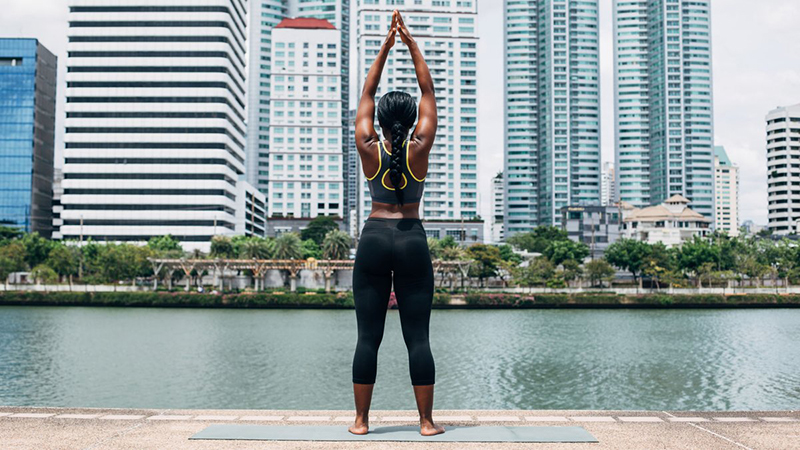By Martin Fritz Hube
We asked some of the most prominent experts what to expect in the coming year
Perhaps now more than ever, the health and fitness world seems full of contradictions. We need to rest more, but sit less. Superior “mindfulness” can come from ditching our phones, but possibly also from downloading the right meditation app. Meanwhile, on the nutrition front, olive oil is celebrated as the key to eternal youth, while the ageless Tom Brady is apparently an olive oil skeptic. It’s all very confusing.
On the other hand, how boring would it be if we’d already unlocked all the secrets to healthier living and superior athletic performance? Thank goodness for uncertainty! Looking ahead to 2019, we’ve once again reached out to a cadre of experts in and around the fitness industry to give us their take on what we will see in the coming year.
“Eat Less, Move More” Will Make a Comeback
I’m guessing that calories will be back as explanations for weight gain and dieting. The arguments about “low-carb” versus “low-fat” go on and on and on, but get nowhere. Attempts to prove one or the other better for weight loss or maintenance remain unconvincing. Advice to eat less and move more still makes good sense. The trick is finding a way to do either—and preferably both—that is so easy to adhere to that it becomes second nature. Individuals have to figure that out on their own, and understanding calorie balance is not a bad way to begin.
—Dr. Marion Nestle, professor of nutrition, food studies, and public health at NYU, emerita, and author of Unsavory Truth: How Food Companies Skew the Science of What We Eat
Gargling Will Become Socially Acceptable
You want to harness the power of your brain to smash mental barriers and push your performance to dizzying new heights—but electrifying your neurons is too crazy and computer-based cognitive training is too boring and mindfulness is too trendy? No problem. Instead, you can hop onto the mouth-sensor bandwagon. Over the last decade, athletes have begun swishing sports drink in their mouths then spitting it out, basically tricking their brains into thinking more fuel is on the way to their muscles—a tactic that can be particularly useful late in a race when the prospect of choking down another gel feels particularly vomitous. Now, as a recent sports nutrition review points out, scientists are exploring other ways of triggering oral receptors to jolt your brain into action: menthol to give you the illusion that you’re not overheating, bitter-tasting quinine to jumpstart your autonomic nervous system before intense exercise; and even capsaicin and other chemicals to trigger a neuromuscular reflex that may fight muscle cramps. Let’s just hope the trend doesn’t spread to indoor sports.
—Alex Hutchinson, Sweat Science columnist and author of Endure: Mind, Body, and the Curiously Elastic Limits of Human Performance
We Will Slowly Learn That Health Starts Within
I firmly believe we will start to see the broader health and fitness industry finally come to realize that health and well-being is—and always has been—an “inside job.” As opposed to solely focusing on external changes, emphasis will be directed internally to understanding the powerful role of the mind, as ultimately how we think about our health and our lives determines how we will feel and how we will act. Given that health and well-being is multidimensional it requires a more holistic approach—one which takes into account the dynamic interplay between physical, mental, emotional, social, and spiritual well-being. This is why in 2019 more people will actively seek to partner with health coaches and integrative wellness professionals in their journey toward meaningful and sustainable lifestyle changes.
—Dr. Jessica Matthews, assistant professor and director of the Master of Kinesiology in Integrative Wellness program at Point Loma Nazarene University
Corrective Exercise Will Enter the Mainstream
In 2019 I hope and expect to see “corrective exercise” to become more popular, especially among endurance athletes. Corrective exercise is kind of a catch-all term for various exercise and therapeutic practices that athletes do outside the context of structured workouts to remove functional limitations such as range-of-motion restrictions. These include foam rolling, stretching, mobility movements, and strength exercises for forgotten body parts such as the feet. More and more physical therapists are prescribing corrective exercise programs for injured and uninjured athletes alike based on functional movement assessments, driving the trend. Granted, this is a service that only a fraction of athletes are currently taking advantage of, but I see the trend continuing to grow because routine corrective exercise is very beneficial for performance and health. There’s a reason the pros do it!
—Matt Fitzgerald, coach, nutritionist and co-author of 80/20 Running
The Kombucha Boom Is Just Getting Started
As a sport dietitian, I’m expecting a few health and nutrition trends. I think CBD products are going to be an even bigger hit in 2019; CBD oil and capsules may help with pain relief, inflammation, and recovery. Plant-based dietary trends will be popular once again, as the incorporation of more plant-based foods into the diet has been shown to be a great way to boost health and to assist in weight loss. I feel Kombucha is only getting started, so I expect even more products boasting gut-health benefits.
—Marni Sumbal, MS, RD, CSSD, LD/N, author of Essential Sports Nutrition
We’ll Keep Falling for the “Quick Fix”
The change cycle of the world we’re living in gets shorter every day. As technology advances astronomically fast, we are stuck with bodies that don’t. While they can adapt relatively quickly to a new environment, quick changes to the body don’t last. To effect real, deeply rooted change, it takes years of consistent dedication, practice and work—a willingness to show up every day no matter what. People today take their cue from the speed of change in every other aspect of their life and continue to look for quick fixes to their ever-increasing body, health, and well-being issues. Smart marketers know this, and feast on this misunderstanding, luring people into looking for quick fixes. E.g.: going on a crash diet to fix the problem of my jeans, suit, or dress “suddenly” not fitting; eating convenient, quick, processed foods because you have no time to cook or shop; taking Ambien for deeper sleep vs. changing sleep habits, or controlling stress through meditation. We continue to take the bait, and as I see it, the gap between these two concepts will is widening, and this trend will continue in 2019.
—Andy Petranek, co-founder of the Whole Life Challenge
Skepticism Towards Supplements Will Increase
I predict that in 2019, people will become increasingly skeptical of taking vitamins and nutritional supplements, as research continues to undermine the case for their effectiveness.
—Gretchen Rubin, author of The Happiness Project
The Recovery Market Will Boom
There will be increased emphasis on recovery offerings from current concepts as well as stand alone spaces. There will be higher interest in actual rest. Several sleep apps are seeing a lot of traction and success. They not only track hours but can also monitor your REM cycles and then graph out for the user, rating their sleep habits. This will piggyback on the already growing “recovery market.”
—Rich Velazquez, COO at Mile High Run Club
We Will Recognize the Value of “Whole Person Fitness”
Fitness programs being framed as less about the body and more about the mind-body system. A combination of a resurgence of perennial wisdom/spiritual traditions (Buddhism, Stoicism), a decrease those following dogmatic religions, and increasing modern science pointing toward the integration of mind and body will (rightfully) lead to programs that were once predominantly about physical fitness (e.g., running, CrossFit, weightlifting) being about whole-person fitness. Going to the gym is, for many people, just as much about mental and spiritual health as it is about physical health. My hope is that this mindset continues to gain traction in the fitness world and eventually starts to spread in the traditional health care system.
—Brad Stulberg, Outside Do It Better columnist and co-author of Peak Performance
Walking Will Become Sexy
I think walking is going to make a comeback. Trends are cyclical and I think with more and more data coming out showing that we just need to move, walking will see a resurgence. I walked 14 miles the other day and I was totally fubar’d. Ultimately, fitness doesn’t have to be complicated. The data clearly shows that we can just go for a walk. Maybe we can make it sexy… maybe it already is… runways for humanity?
—Dr. Allen Lim, elite cycling coach and sports physiologist
We Will Finally Understand that Health Is Holistic
Focus will increase on balancing physical fitness with health and well-being across all areas of your life as a true measure of your health—areas like relationships, work, purpose, effectiveness, and joy. Awareness of the synergy of exercise with other ways of creating and maintaining health will lead people to seek more balance between time at the gym and time pursuing a greater vision for themselves.
—Michael Stanwyck, co-founder of the Whole Life Challenge
We Will Eat More Mushrooms
Humble mushrooms will continue to be a huge trend in 2019, because they sit at the heart of three major trends. “Upcycling” and closed loop systems: mushrooms are nature’s great recyclers and are being used in sustainability plays. Their power as a functional food and being a source of adaptogens: they help fight inflammation, boost the immune system, and can help provide sustained, clean energy. And, finally, plant-based eating: mushrooms deliver a hefty dose of umami, helping even meat lovers feel that meaty taste. They are showing up in everything from coffee and teas (such as Four Sigmatic), to health and beauty products, to “burger blends” on restaurant menus.
—Kate Geagan, nutrition pioneer and author of Go Green Get Lean
Virtual Fitness Will Take Over
Digital fitness will continue to outpace analog fitness. New internet tools and apps will do to running, cycling, and other traditionally outdoor activities what Amazon did to bookstores. Massively multiplayer online games like Zwift will usher in a new era of home-based exercise, blurring the lines between gaming and training. Gritty basement workout grottos will evolve into high-tech personal fitness centers, and will be referred to as “labs” and “studios” rather than “pain caves.” Historians may one day look back upon 2019 as an inflection point where humans diverged from the natural world and became subsumed in a virtual one.
—Nick Heil, Outside contributing editor and author of Dark Summit




